Intermarkets' Privacy Policy
Donate to Ace of Spades HQ!
aceofspadeshq at gee mail.com
Buck:
buck.throckmorton at protonmail.com
CBD:
cbd at cutjibnewsletter.com
joe mannix:
mannix2024 at proton.me
MisHum:
petmorons at gee mail.com
J.J. Sefton:
sefton at cutjibnewsletter.com
While Serving as UK's Top Prosecutor, Keir Starmer Routinely Let Off Grooming Gang Rapists With... A Warning Letter
The Morning Rant
Mid-Morning Art Thread
The Morning Report — 2/24/26
Daily Tech News 24 February 2026
Overnight Open Thread [02/23/2026]
Capybara Crash-Up Cafe
Quick Hits
Drew Holden: Leftwing Media "Analysts" Are Baffled by the "Mysterious" One-Year Plunge in Crime.
Spoiler: It's Only a Mystery to Propagandists Who Won't Admit the Obvious
Jim Sunk New Dawn 2025
Jewells45 2025
Bandersnatch 2024
GnuBreed 2024
Captain Hate 2023
moon_over_vermont 2023
westminsterdogshow 2023
Ann Wilson(Empire1) 2022
Dave In Texas 2022
Jesse in D.C. 2022
OregonMuse 2022
redc1c4 2021
Tami 2021
Chavez the Hugo 2020
Ibguy 2020
Rickl 2019
Joffen 2014
maildrop62 at proton dot me
CAC's Spaced-Out Challenge: Galaxy Guide (Part 1)
Apologies for my late posting of this week's edition, going back to the regular Wednesday schedule this week.
This edition will feature objects best viewed from a dark sky site. To best appreciate most of the features discussed in the Milky Way Challenges, I recommend visiting a site colored at least green zone or better, blue/grey/black preferred, on the map and link below.
Milky Way observing runs by the same rules as deep sky object observing: wait for a new moon, or when the moon isn't up to brighten the sky. Use red-LED lighting to preserve night vision. Allow your eyes to adjust at least thirty minutes before observing. Avoid ingesting alcohol or narcotics as these will interfere with your vision.
Ready? Read on.

The Jshine Dark Sky Finder here is a great google map hybrid with marked dark sky locations for the lower 48 I've used several times in hunting down better skies. Any regions that aren't highlighted on jshine with white-red-orange-yellow-blue-green have pretty much prestine skies. It uses a map overlay though that makes the northeast and midwest "brighter" than they actually are, so keep the above county-level map in mind if you live in those regions.
The Milky Way from our perspective "wraps" around us, with the brighter portion (looking more towards the inside of the galaxy) visible in the summer months and the fainter portion visible in the winter. As we are in summer, we are going to focus on the features in this brighter portion over the next few weeks, and we'll begin from the very heart of our home, roughly midway between Sagittarius and Scorpius.
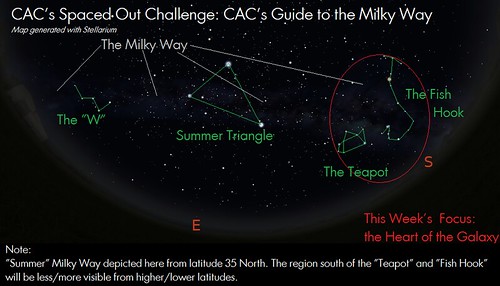
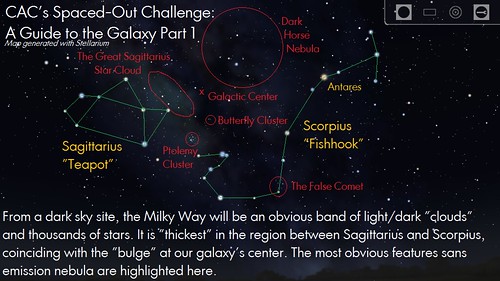
Interesting objects near the Galactic Center (from our perspective) are the focus this week, and we'll stick with five.
The Galactic Dark Horse

The "Dark Horse" nebula is actually made up of several smaller "dark" nebulae creating a large horse lined diagonally with the rest of the milky way band, hovering in the constellation Ophiuchus over the midpoint between Sagittarius and Scorpius. The darker and more obvious the "horse", the darker your skies are overall. Some residents of yellow/borderline green Bortle sky zones can spot darker segments of it on clear nights. The darker portion towards it's rear appears in more washed-out skies as a smoking pipe, hence it's alternate name, the Pipe Nebula. The Galactic Horse may be tricky to spot even from a perfect site, but once it "pops" out at you, you'll wonder how you ever overlooked it.
The overview chart should be enough to locate it naked-eye, but if you're having trouble, start over at the red star Antares in the Fish Hook (Scorpius), then "arc" a bit with your eye wandering through the thickest region of the milky way towards Sagittarius. Dark regions should leap out from a good sight, and the largest of these form the bottom of the horse.
The Great Sagittarius Star Cloud
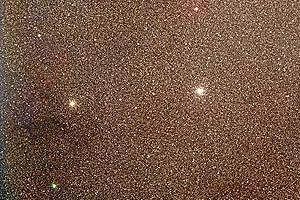
The Great Sagittarius Star Cloud is the deepest galaxy feature that can be seen in visible light, a mere 1800 light years from the center. Unlike much of the rest of the galaxy's bulge, which is obscured by massive dust clouds, "Baade's Window", a gap in the closer spiral arms discovered by astronomy Walter Baade, offers a sizable opening straight into the Milky Way's heart. Through binoculars, it is impossible to resolve the millions of stars tightly packed in the galactic core, but in a moderate telescope you might get some luck, and try for two globular clusters "embedded" within: NGC 6522 and 6528. Small, faint dark nebulae appear here and there (and really pop with binoculars) and give a great sense of depth, shattering the illusion of the milky way's apparent two dimensional appearance over our heads.
As an interesting note on the star cloud, on the chart above there appears a red X just due "west" of it. This marks the physical center of our Milky Way, inside which supermassive black hole Sagittarius A* is quietly humming away.
Ptolemy's Cluster
One of the longest-known clusters in the sky, it was first catalogued by Ptolemy almost 2000 years ago as "the nebula following the sting of Scorpius". It is the brighter of the two open Messier clusters in Scorpius, easily visible from all but the most light-polluted sites. A solid dozen stars jump out at you, but a quick peak through binoculars reveals the brilliance and scale of the cluster:
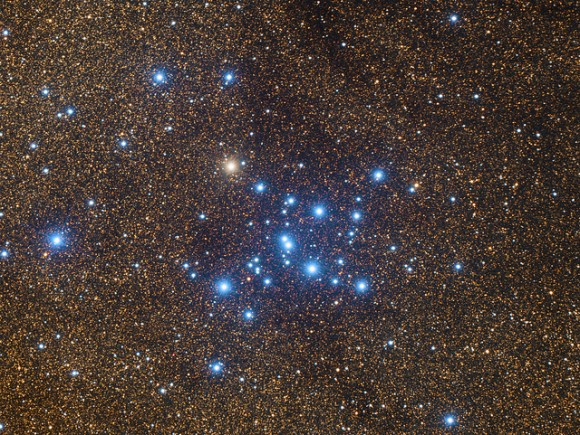
The stars shown are only about 1000 light years away from us, providing an interesting contrast to the smattering of galactic bulge stars behind it and further expanding our sense of depth when examining the galaxy.
The Butterfly Cluster
Due north west of the bright Ptolemy Cluster is another naked-eye open, slightly smaller but with it's own bit of magic. A collection of mostly blue B type stars (with one bright orange K star exception) about 1600 light years away, historians debate on it's initial "discoverer", as Ptolemy may have lumped it in with the aforementioned cluster as a continuous batch of nebulosity. Regardless who found it first, take a pair of binoculars and enjoy how this particular grouping got it's name:

The False Comet in Scorpius
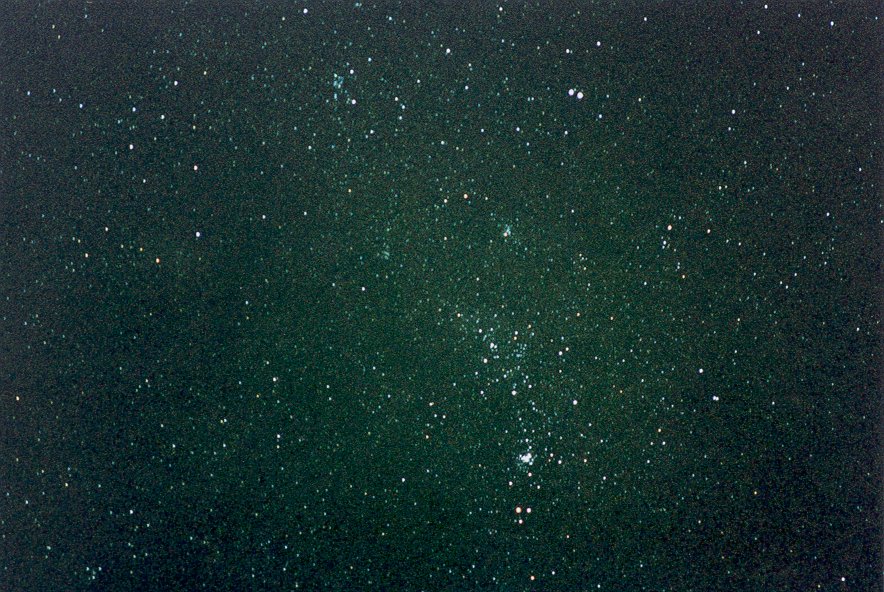
Our last target is a trick of the eye. Aim your binoculars and the illusion is shattered, but the components of the apparent "comet" are themselves beautiful targets:
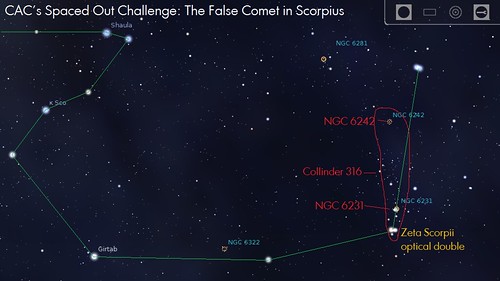
At the head or coma of the comet is gorgeous optical double Zeta Scorpii, the star where the tail of the Scorpion begins to curl. To it's north and east, the comet's tail is formed by star clusters NGC 6231, Collinder 316, and NGC 6242. In terms of demonstrating the layers of the galaxy, the False Comet exposes the illusion of stars appearing close to one another: the component stars of the optical double Zeta Scorpii are six-thousand light years apart.
If you can, I seriously suggest you pick up the July issue of Sky and Telescope, which has an incredible guide to the structure of the Milky Way, part one dovetailing well with this week's Challenge: the region between Sagittarius and Scorpius.
Next week, we move our focus to the nebulae from Scutum to Sagittarius, working our way both visibly and physically outwards from the galactic heart and closer to our own backyard. As always, use Ace's Amazon storefront for your astro needs, check out the light pollution object list here, clear skies to you and keep looking up!
Maj. Healey [/i]: "[i]248 Puerto Vallarta is full of expat fags anywa ..."
Comrade Flounder, Disinformation Demon: "Nood. ..."
Comrade Flounder, Disinformation Demon: "Time to make the punishments fit the crimes for th ..."
ChristyBlinkyTheGreat: " Extermination is the only solution. Make thei ..."
1st Lt Michael D. Edwards, meteorologist assigned to the 57 FIS: "249 After Greenland, maybe Trump can save Iceland: ..."
Yudhishthira's Dice: "Whenever a child is raped by an Arab savage, a Lef ..."
Huck Follywood: "In other news: Gavin Newsom is stupid. Posted by: ..."
Braenyard - some Absent Friends are more equal than others _: "It's time for out locals to man up. Be careful of ..."
Boss Moss: "The Canadian looters look low T. ..."
18-1: "[i]They'd be killed by all the violent 3rd worlder ..."
mrp: " The fact that Starmer now rails against harmful s ..."
While Serving as UK's Top Prosecutor, Keir Starmer Routinely Let Off Grooming Gang Rapists With... A Warning Letter
The Morning Rant
Mid-Morning Art Thread
The Morning Report — 2/24/26
Daily Tech News 24 February 2026
Overnight Open Thread [02/23/2026]
Capybara Crash-Up Cafe
Quick Hits
Drew Holden: Leftwing Media "Analysts" Are Baffled by the "Mysterious" One-Year Plunge in Crime.
Spoiler: It's Only a Mystery to Propagandists Who Won't Admit the Obvious
Paul Anka Haiku Contest Announcement
Integrity SAT's: Entrance Exam for Paul Anka's Band
AllahPundit's Paul Anka 45's Collection
AnkaPundit: Paul Anka Takes Over the Site for a Weekend (Continues through to Monday's postings)
George Bush Slices Don Rumsfeld Like an F*ckin' Hammer
Democratic Forays into Erotica
New Shows On Gore's DNC/MTV Network
Nicknames for Potatoes, By People Who Really Hate Potatoes
Star Wars Euphemisms for Self-Abuse
Signs You're at an Iraqi "Wedding Party"
Signs Your Clown Has Gone Bad
Signs That You, Geroge Michael, Should Probably Just Give It Up
Signs of Hip-Hop Influence on John Kerry
NYT Headlines Spinning Bush's Jobs Boom
Things People Are More Likely to Say Than "Did You Hear What Al Franken Said Yesterday?"
Signs that Paul Krugman Has Lost His Frickin' Mind
All-Time Best NBA Players, According to Senator Robert Byrd
Other Bad Things About the Jews, According to the Koran
Signs That David Letterman Just Doesn't Care Anymore
Examples of Bob Kerrey's Insufferable Racial Jackassery
Signs Andy Rooney Is Going Senile
Other Judgments Dick Clarke Made About Condi Rice Based on Her Appearance
Collective Names for Groups of People
John Kerry's Other Vietnam Super-Pets
Cool Things About the XM8 Assault Rifle
Media-Approved Facts About the Democrat Spy
Changes to Make Christianity More "Inclusive"
Secret John Kerry Senatorial Accomplishments
John Edwards Campaign Excuses
John Kerry Pick-Up Lines
Changes Liberal Senator George Michell Will Make at Disney
Torments in Dog-Hell
The Ace of Spades HQ Sex-for-Money Skankathon
A D&D Guide to the Democratic Candidates
Margaret Cho: Just Not Funny
More Margaret Cho Abuse
Margaret Cho: Still Not Funny
Iraqi Prisoner Claims He Was Raped... By Woman
Wonkette Announces "Morning Zoo" Format
John Kerry's "Plan" Causes Surrender of Moqtada al-Sadr's Militia
World Muslim Leaders Apologize for Nick Berg's Beheading
Michael Moore Goes on Lunchtime Manhattan Death-Spree
Milestone: Oliver Willis Posts 400th "Fake News Article" Referencing Britney Spears
Liberal Economists Rue a "New Decade of Greed"
Artificial Insouciance: Maureen Dowd's Word Processor Revolts Against Her Numbing Imbecility
Intelligence Officials Eye Blogs for Tips
They Done Found Us Out, Cletus: Intrepid Internet Detective Figures Out Our Master Plan
Shock: Josh Marshall Almost Mentions Sarin Discovery in Iraq
Leather-Clad Biker Freaks Terrorize Australian Town
When Clinton Was President, Torture Was Cool
What Wonkette Means When She Explains What Tina Brown Means
Wonkette's Stand-Up Act
Wankette HQ Gay-Rumors Du Jour
Here's What's Bugging Me: Goose and Slider
My Own Micah Wright Style Confession of Dishonesty
Outraged "Conservatives" React to the FMA
An On-Line Impression of Dennis Miller Having Sex with a Kodiak Bear
The Story the Rightwing Media Refuses to Report!
Our Lunch with David "Glengarry Glen Ross" Mamet
The House of Love: Paul Krugman
A Michael Moore Mystery (TM)
The Dowd-O-Matic!
Liberal Consistency and Other Myths
Kepler's Laws of Liberal Media Bias
John Kerry-- The Splunge! Candidate
"Divisive" Politics & "Attacks on Patriotism" (very long)
The Donkey ("The Raven" parody)

